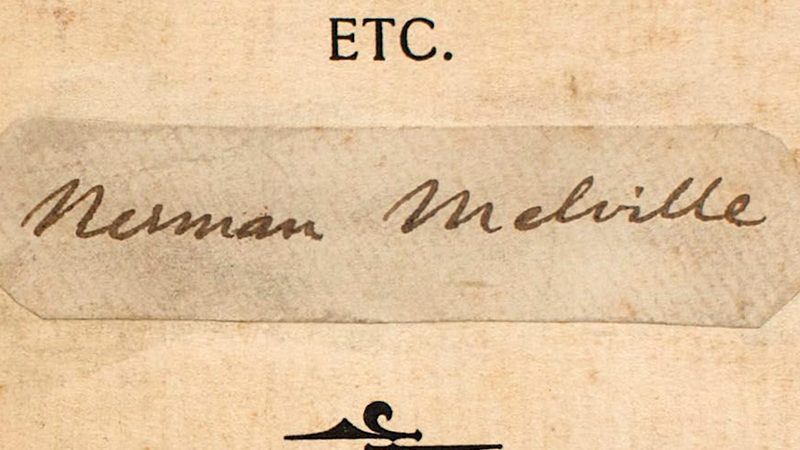Date / Time
- February 24, 2019
12:00 pm - 2:00 pm - March 24, 2019
12:00 pm - 2:00 pm - April 28, 2019
12:00 pm - 2:00 pm - May 19, 2019
12:00 pm - 2:00 pm
- This course has been postponed till Fall 2019
- Rosenbach members at the Contributor level and above receive a 10% discount on tuition. If you are unsure if you qualify for the discounted tuition please call (215) 732-1600 x 138 or email [email protected].
- Not a member? We invite you to join upon registration. Click here for more information about membership.
Description
Before sliding into obscurity, Herman Melville was one of the most popular and infamous American writers of the nineteenth century. With the 1846 publication of Typee, a semi-autobiographical novel based on his own experiences as a whaleboat deserter captured by indigenous people of the Marquesas Islands, Melville became known as the “man who lived among the cannibals.” The reputation earned him wide readership, and the novel furthered the idea of him as an adventure writer whose tales would titillate readers with far-flung and frequently erotic accounts while scandalizing them with polemics against Christian missionaries, colonialism, and the notion of the West as somehow a beacon of “civilization.” As Melville’s career progressed, his focus shifted toward less lucrative themes, including the shortcomings of white liberalism, the drudgery of office work, the fragility of masculinity, and the sterility of modern life. Only decades later, at the beginning of the twentieth century, did Melville’s later work begin to acquire readers and reputation, leading him to become of the most canonical and bespoken of nineteenth-century American writers.
This four-week course won’t be anything close to a comprehensive survey of Melville’s writings. Yet by setting aside his behemoth, Moby-Dick, we will acquire depth into key texts that help us gain perspective on his career and, even more importantly, insight into his arguments about politics, power, self-deception, and modernity. We’ll begin, of course, with Typee, ascertaining just what all that 1840s fuss was all about. From there, we’ll read some of the short fiction written in the years following the 1851 publication of Moby-Dick: including “Bartleby, the Scrivener,” a short story that became something of an Occupy Wall Street mascot in 2011, and Benito Cereno, a novella that provides one of the period’s most harrowing accounts of the slave trade. During our third week, we’ll read the 1866 Battle-Pieces and Aspects of the War, Melville’s brilliant and frustrating collection of Civil War poetry, a volume that looks forward to the compromises of the postwar period as much as it reflects on the previous four years of violence. And, finally, for our last session, we’ll read the novella Melville left unfinished at the time of his death, Billy Budd, Sailor, and we’ll think about Melville’s enduring relevance by examining two of that text’s twentieth-century adaptations: Benjamin Britten’s and E. M. Forster’s 1951 opera, Billy Budd, and Claire Denis’s 1999 film, Beau Travail.
Syllabus
About the Instructor
Travis Foster is an Assistant Professor at Villanova University where he writes and teaches about American literature and culture up to roughly 1900. His research focuses on anti-black racism, queer studies, genre and genre criticism, and regionalist fiction, especially Sarah Orne Jewett.
His first book, Genre and White Supremacy in the Postemancipation United States, is forthcoming as part of the Oxford Studies in American Literary History series, He is currently working on a second book project, tentatively titled White Supremacy’s Queer Desires: A Racial History of Lesbian and Gay American Literature. With Timothy Griffiths, he is also co-editing a special issue of Legacy, “American Women’s Writing & the Genealogies of Queer Thought.”
About Rosenbach Courses
Revisit beloved classics or experience new ones with Rosenbach courses. Book lovers delve into fiction, history, and poetry with the guidance of a literary expert and the company of other readers. Tuition varies according to length of the course; Rosenbach members at the Contributor level and above receive a 10% discount on tuition.
Date / Time
- February 24, 2019
12:00 pm - 2:00 pm - March 24, 2019
12:00 pm - 2:00 pm - April 28, 2019
12:00 pm - 2:00 pm - May 19, 2019
12:00 pm - 2:00 pm

